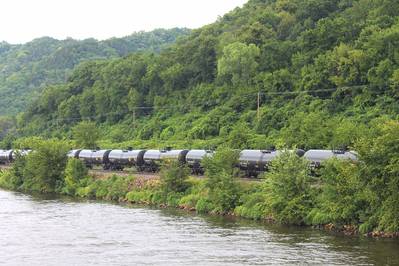Canadian Natural Resources eyes Rail Contracts
Canadian Natural Resources, the country's biggest oil and gas producer, is looking at taking on the Alberta provincial government's contracts to move crude by rail, a senior company executive said on Thursday.
Shipping more crude by rail is seen as critical for Canadian oil producers due to congested pipelines that forced Alberta to order mandatory oil curtailments this year.
Alberta's United Conservative Party government said in June that it would divest rail contracts amounting to 120,000 barrels of crude per day (bpd) to the private sector this fall. The contracts were signed by the previous New Democratic Party government.
"To go forward with it, obviously it has to make sense, but we're in the process and we're looking at it," Canadian Natural President Tim McKay said on a quarterly conference call.
In an interview, McKay said the government had set a deadline by the end of August to receive proposals from bidders. He declined to say how much volume Canadian Natural wants to take on.
"We have to look at it from the company's perspective in terms of the economics and how it works into our whole operational piece," he said.
Samantha Peck, spokeswoman for Alberta Energy Minister Sonya Savage, said the government still expects to complete the divestments this fall.
Canadian Natural currently ships 14,000 bpd, McKay said.
Railways moved 285,131 bpd of Canadian crude in May, the most since January when curtailments took effect, according to the National Energy Board.
Curtailments have been effective in draining Alberta's oil in storage and in averting job losses, McKay said. The company expects the mandatory cuts to last through 2019.
Canadian Natural shares fell 5% in Toronto, in line with broad weakness in the sector as global oil prices sank.
The Calgary, Alberta-based company beat estimates for quarterly profit, as higher prices helped offset lower production.
Canadian Natural said average realized prices for crude and natural gas liquids ticked up 3.8%, while natural gas prices climbed 1.5% in the second quarter.
The company, which in June bought Devon Energy Corp's Canadian assets for C$3.8 billion, said daily production fell to 1.03 million barrels of oil equivalent per day from 1.05 million.
Net earnings rose to C$2.83 billion, or C$2.36 per share from C$982 million, or 80 Canadian cents, a year earlier.
On an adjusted basis, the company earned 87 Canadian cents per share, beating analysts' estimates for 85 Canadian cents per share, according to IBES data from Refinitiv.
By Rod Nickel and Taru Jain






